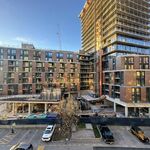yyzer
Senior Member
while there are probably some risks in the market right now, a key difference between 1989 and 2008 is that in 1989 interest rates were high, and headed higher (around 14.5 % if memory serves), and in 2008 they are low and headed lower (what, about 5.75% for a fixed rate 5yr term, and about 4.05% for variable?)....
in March of 1989 everyone was absolutely bullish on real estate, and the newspapers were printing things like "well, it's still cheaper here than in Tokyo"....whereas today, many people are nervous about real estate, and many newspaper articles are bearish..
I don't see a crash like 1989 happening...
and any agent who has been in real estate longer than a month can tell you of open houses they have conducted, even in peak boom times, where almost nobody showed up - it happens all the time..
in March of 1989 everyone was absolutely bullish on real estate, and the newspapers were printing things like "well, it's still cheaper here than in Tokyo"....whereas today, many people are nervous about real estate, and many newspaper articles are bearish..
I don't see a crash like 1989 happening...
and any agent who has been in real estate longer than a month can tell you of open houses they have conducted, even in peak boom times, where almost nobody showed up - it happens all the time..




